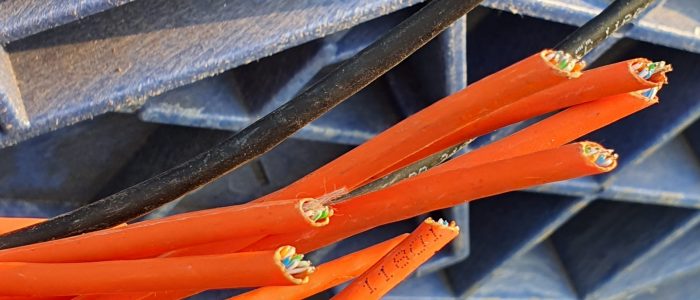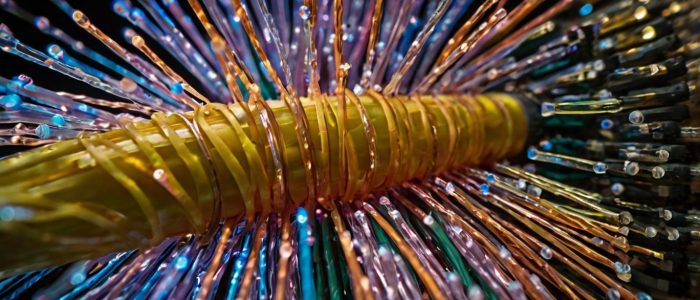
Copper Cable vs Fibre Cable
In the rapidly evolving world of technology, the debate between copper cable and fibre cable continues to be a hot topic. Both types of cable are essential for data transmission, but they have key differences that make each suited for particular applications. Whether you’re setting up a new network for your business or upgrading your home internet, understanding the pro’s and con’s of copper and fibre cables can help you make an informed decision. So copper cable vs fibre cable, what are their advantages and disadvantages? Throughout this article we will cover all areas so you can make a decision on which is best suited for your needs.
Copper Cable:
Copper cable has been the backbone of telecommunications for over a century. The standard data cables (cat 5/6) are known for their reliability and widespread use which makes it a familiar choice for many.
Advantages:
- Cost-Effective: Copper cable is generally cheaper than fibre cables. This is an attractive factor for small businesses or people on a budget.
- Ease of Installation: Due to their long-standing presence in the market, copper cables are much easier to install and maintain. This is also because most technicians are well-versed in working with copper.
- Power Supply: Copper cables can carry electrical power, making them useful for power over ethernet (PoE) applications. This can simplify installations by reducing the need for separate power sources.
- Sustainability: Due to their copper content, these cables can be recycled with cable recycling centres like ours to produce more cables. This makes for a more sustainable future.
Disadvantages:
- Limited Bandwidth: Copper cables have a lower bandwidth compared to fibre cables. This means that they can’t handle as much data at once, which can be a massive drawback for high-demand applications.
- Singal Degradation: Over long distances, the signal transmitted through copper cables tends to degrade. This means that the further away from the router the application is, the lower the connection speed.
- Susceptibility to Interface: Copper cables are more prone to electromagnetic interference (EMI), which can affect performance, especially in places with a lot of electronic noise.

Fibre Cable:
Fibre optic cables represent the cutting edge of data transmission technology. By using light to transmit data, fibre cables offer several advantages over their copper counterparts.
Advantages:
- High Bandwidth: Fibres can handle much larger amounts of data than copper cables. This makes them ideal for applications requiring high-speed internet and large data transfers.
- Long-Distance Transmission: Unlike copper, fibre cables can transmit data over much longer distances without significant signal loss. This makes them ideal for long-haul telecommunications.
- Resistance to Interference: Fibre cables are immune to electromagnetic interference, ensuring a more stable and reliable connection, even in electrically noisy environments.
Disadvantages:
- Cost: The initial cost of fibre cables and their installation can be higher compared to copper data cables. This can be a significant factor for smaller businesses and residential users.
- Fragility: Fibre Optic cables consist of glass, making them a lot more delicate than copper cables, therefore requiring careful handling. Bending or mishandling can damage the fibres and disrupt the transmission.
- Specialized Installation: Installing fibre cable requires specialized skills and equipment, which can increase the overall installation cost and time.
- Sustainability: Fibre cable uses ultra-thin glass as fibre’s main component, and it uses light instead of copper to transfer data. This makes it less cost-effective to recycle than copper data cables. Because of this, the waste cables are less likely to be recycled and there isn’t as much of a sustainable cycle for fibre.

Choosing The Right Cable For Your Needs:
The decision between copper and fibre cables ultimately depends on your specific needs and circumstances.
- For Home Use: If your setting up a home network where cost and ease of installation are primary concerns, copper cables might be the better option. However, if you’re a heavy internet user or you plan for the future, investing in fibre may be beneficial.
- For Small Businesses: Copper Cables can be a cost-effective solution for small businesses with modest networking needs. However, businesses expecting significant growth in data demand should consider fibre due to it scalability & future-proofing capabilities.
- For Large Enterprises: Fibre optic cables are often the best choice for large enterprises due to their high bandwidth, long-distance capabilities and reliability. The initial investment is justified by the superior performance and longevity.
- For Recycling Purposes: When it comes to recycling, fibre optic cable is not really cost-effective to recycle. Due to its glass components, and zero copper, it’s not worth recycling when you factor in the cost of separating the materials. Obviously, with copper cable it is much easier to break down the components and extract the copper, making recycling worthwhile.
The Future of Networking:
As technology continues to advance, the use of fibre optic cables is expected to become more widespread. Innovations in manufacturing and installation techniques may also reduce costs, making fibre more accessible to a broader audience. Meanwhile, copper cables will continue to be relevant, especially in scenarios where cost and simplicity are critical factors.
In conclusion, both copper and fibre cables have their unique advantages and are likely to coexist for the foreseeable future. By understanding their differences, you can make a more informed decision and choose the right type of cable for your specific needs. Whether you opt for the tried-and-true reliability of copper or the high-speed capabilities of fibre, staying connected in our increasingly digital world has never been more crucial.




